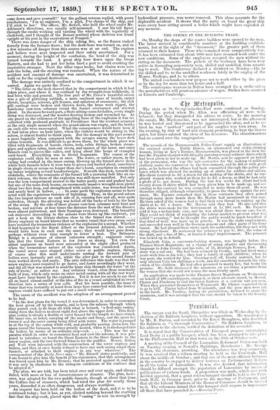tht Aittrupolis.
The riots at St. Gearge's-in-the-East were continued on Sunday. During the period when Mr. Allen was officiating all were well- behaved ; but they disregarded his advice to retire. In the morning the curate, Mr. Machonochie, was not interrupted, but in the afternoon he was hooted and threatened as he approached the altar, and as he re- tired he was " mobbed " and part of his surplice was torn away. In the evening, by dint of hard and eloquent preaching, he kept the rioters quiet, but hisses saluted the close of his discourse. The churchwardens had no control over the congregation.
The records of the Hammersmith Police Court supply an illustration of the contract system. Emily Dawes, an attenuated and sickly-looking woman, living. at Key's Terrace, Hammersmith, was placed in the dock be- fore Mr. Paynter charged with illegally pawning several soldiers' shirts which had been given to her to make up. Mr. Martin said he appeared on behalf of the prosecutor, who was the sub-contractor for the making of military clothing under the contractor to the Government, and he did so with great pain, as he believed the offence had been committed through the paltry pit- tance which was allowed for making up of shirts for soldiers and sailors. His client received 58. 6d. a dozen for the making of the shirts, and he em- ployed women who worked at them for 48. 6d. a dozen, so that he had only a profit of Is. per dozen. During the last few weeks his client had lost twenty dozen of shirts which had been given him to be made up, and ac- cording to his contract he was compelled to make them all good. He was therefore obliged, although reluctantly, to press the charge against the pri- soner. Mr. Punter remarked that in these contracts they often passed through many more hands than Mr. Martin had mentioned in this case. He then asked if the women had to find their own thread in making up the shirts at 4s. 6d. a dozen. Mr. Martin said they had. He also said that the shirts were made for the Government at Is. 10d. each. Mr. Paynter said it was a melancholy case, and he was afraid there was no cure for it. They could not think of regulating the labour market to prevent what was called "sweating," but he thought the public would be much benefited if that kind of work was made up in prisons. It was the right employment, and succeeded very well in the German prisons and other parts of the Con- tinent. He had pressed those views upon the authorities, but they met with strong objections. He sentenced the prisoner to pay ls. 104., the value of the shirt, and a fine of 208., or fourteen days' imprisonment. The prisoner was locked up in default.
Elizabeth Cain, a careworn-looking woman, was brought before the Thames Street Magistrate, on a charge of using abusive and threatening language to John Crosby and his wife, of 11, Denbigh Terrace, Bow. Her story was a sad one. She had been seduced by Crosby, and had lived many years with him as his wife ; they had a family of eight children; when he was poor, she worked for him. Growing well off, Crosby married, but he only allowed Cain ten shillings a week, and did something towards the edu- cation of the children. He had often promised to marry her, but broke his promise. Mr. Selfe discharged the summons on receiving a promise from the woman that she would not annoy the man Crosby again.
An application was made to the Thames Street Magistrate on Wednesday on behalf of 100 coalwhippers, engaged, so their advocate stated, by Messrs. Chater and Pluckrose to coal the Great Eastern at a certain rate per man. When they presented themselves at Weymouth Mr. Chater requested them to go to hell. Chater bolted from Weymouth, and the poor men were left in the lurch. Mr. Yardley, having no jurisdiction, declined to grant the summons, and it was arranged that the case should be taken to the County Court.


























 Previous page
Previous page